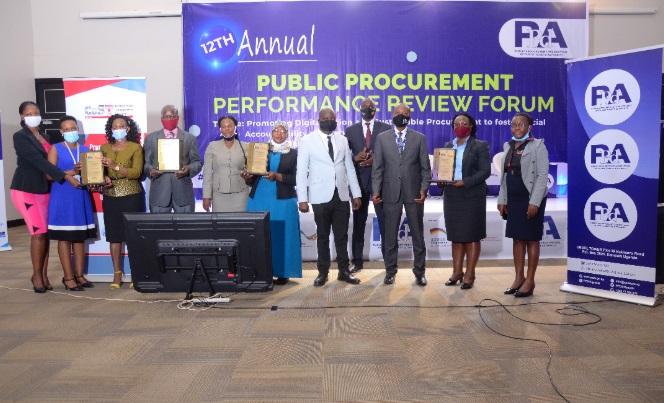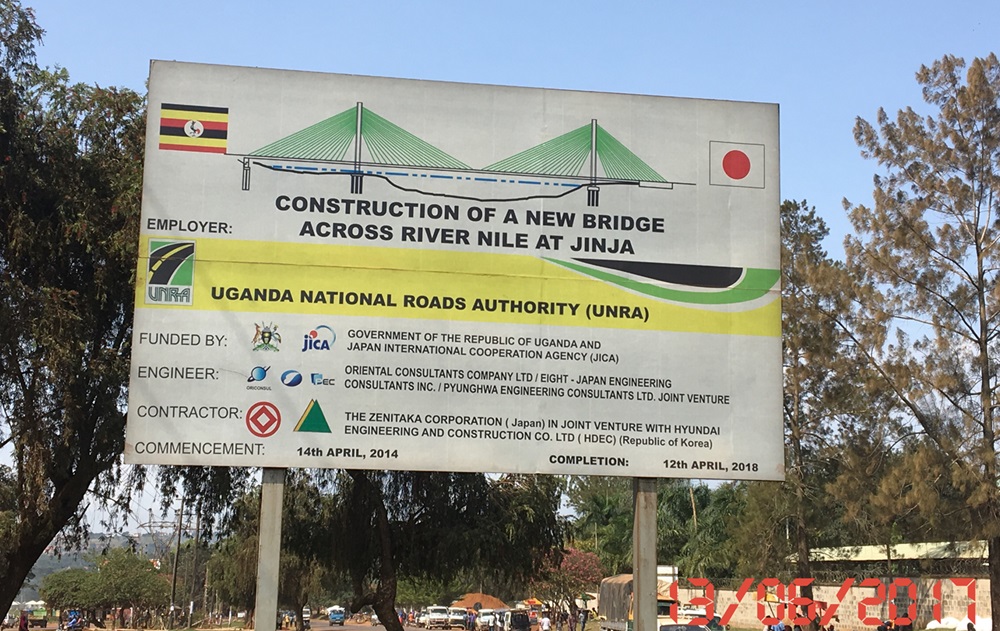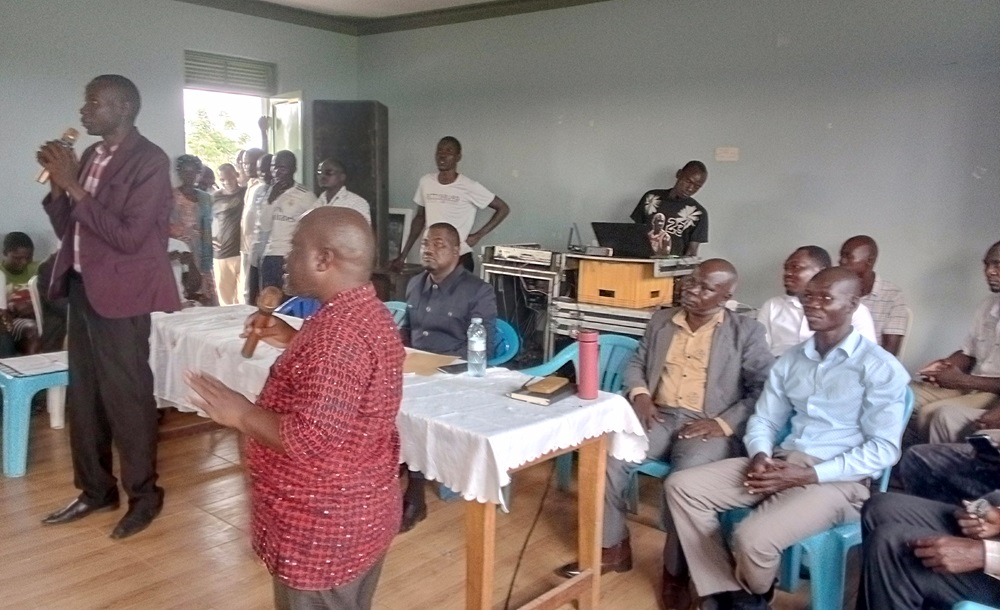CoST Uganda published its 4th Assurance Report titled Ray of Sunshine, A Report of the 4th Assurance Process in Uganda on, 10th February 2021. The 4th Assurance process focused on 23 public infrastructure projects from eight Procurement Entities. The Assurance process was spread through the sectors of Education, Health, Water and Environment, Works and Transport.
Since FY2016/17, the Office of the Prime Minister (OPM) has been partnering with CoST Uganda in promoting good governance through jointly conducting activities for enhancing effective performance assessment of public service delivery.
“CoST Uganda has often kept OPM well-informed through timely submission of reports established through independent assessments and research especially on Infrastructure projects and levels of open contracting by procuring entities for public sector projects. In regard to the previous reports that OPM has received from CoST, we have taken a keen interest in the findings and recommendations from CoST’s reports. The recent recommendations have been incorporated into the Government Annual Performance Review (GAPR) Action Matrix that was generated by the Cabinet in September 2020 during the Cabinet retreat to review the Government performance of FY2019/20.” Permanent Secretary, OPM.
Flashback on the 3rd Assurance process;
In the 3rd Assurance process, it was observed and reported that i) no information could be established to inform the relationship among stakeholders for projects from UNRA, MEMD, and MoES, ii) information accessed and visits from projects under MWE and MoH revealed that there were stakeholder engagements however, the relationship was irregular among stakeholders, iii) Ministry of Water and Environment engaged citizens and had evidence of meetings held with the citizens, however, citizens did not own the projects and had a tendency of referring to public projects as “for government or the entity and not for them”. There was a general concern of the neighboring communities in Yumbe on the MoH project about the potential effects of construction of the wastewater treatment lagoons in a residential area, the problem of time and cost overruns and poor construction quality management lingered across many projects in the 3rd Assurance report among others.
It was recommended to OPM that i) Procuring Entities should be required to disclose data related to managing relationships with stakeholders in the project’s delivery processes, ii) PDEs should encourage citizens benefitting from projects to contribute towards the periodic maintenance of the completed projects. For example, cleaning of solar panels for the Nyamihanga Solar Irrigation scheme without waiting for the Ministry of Water and Environment to have them completely functional throughout the year, ii) PDEs should be required to disclose and communicate the benefits (social and economic) of projects to the citizens at all levels of project delivery. ii) PPDA should make citizen engagement meetings on infrastructure projects mandatory in the contracts and as a responsibility of the entities. Entities should also be required to report on this indicator in their quarterly reports. This would rebuild trust and citizen ownership of the projects.
On 8th September 2020, the OPM, through the Office of the Permanent Secretary, thanked the management of CoST International for the continued commitment to building synergy with the Government through routine participatory performance assessment of public services, engaging citizens, and creating awareness through information disclosure among other citizens’ rights. To that effect, the OPM pledged its commitment to partner with CoST Uganda in matters regarding community engagement through Barraza platforms, on public infrastructure projects.
In their letter, they informed CoST Uganda that the list of issues that were raised during the citizen’s engagement Barazas and the findings of the 3rd Assurance process which CoST Uganda submitted to the Government were studied by OPM and included in the Government Annual Performance Report (GAPR) for the Financial year 2019/2020 which were reviewed by Cabinet in a retreat on 15th and 16 September 2020. They recommended to the responsible Sectoral Ministry to further take them up as action points for their attention and further follow-up.
“CoST Uganda has often kept OPM well-informed through timely submission of reports established through independent assessments and research especially on Infrastructure projects and levels of open contracting by procuring entities for public sector projects. In regard to the previous reports that OPM has received from CoST Uganda, we have taken a keen interest in the findings and recommendations. The recent recommendations have been incorporated into the Government Annual Performance Review (GAPR) Action Matrix that was generated by the Cabinet in September 2020 during the Cabinet retreat to review the Government performance of FY2019/20.” Permanent Secretary, OPM
A growing culture of transparency? Disclosure increases by 20% in the 4th Assurance process;
In the 4th Assurance process, the disclosure of information was analyzed based on the CoST Infrastructure Data aligned to the Assurance methodology provided in the CoST Assurance manual, with the standard indicators/issues against key observations and comments made through the assurance process. These indicators are assessed right from the start of the assurance process; they include proactive and reactive disclosure, overruns of costs and time, tender management, implementation, and quality, and inclusiveness and quality. Proactive disclosure assessment looked at all forms of public platforms including physical project signboards, websites of the PE, beneficiary institutions, funder and PPDA (the Government Procurement Portal), and disclosure publications by the Procurement Entity (PE).
Their overall level of disclosure increased to 62% across the 23 projects in the 4th Assurance process, with an increase of 20% in the 3rd Assurance process, where 7 of the entities engaged in the 4th Assurance had participated. This increase is a sign of the growing culture of transparency across entities engaged by CoST through the Assurance process, perhaps, the entities and public officials have progressively appreciated the contribution of the exercise in project performance and the need for transparency.
Proactive disclosure for all 8 PE’s was 55% (ranging from 20% with the Wakiso District Local Government (WDLG) to 85% with the Uganda National Roads Authority. WDLG has not improved its proactive disclosure in the past three exercises. Projects in the Uganda National Roads Authority (UNRA) complied with an average of 86% of data points in the 4th Assurance exercise. However, the donor websites disclosed various potential data points from sources other than the UNRA website itself. There was a 44% on average of the projects disclosed for the Ministry of Works and Transport. However, 78% of the required data points were disclosed in the construction of the Parliament project. MoWT disclosures occurred at many border posts in Busia, Malaba, Elegu, Katuna, and Mirama, it should be noted that, at most of these border points, construction works were complete by the time of the Assurance exercise, and thus, disclosure was expected to be high. Disclosure for the other PEs was fair at 51% with MWE, KCCA, NWSC, and MoH at 55% and MoES at 59%.
It was observed that proactive disclosure decreased from the previous assurance exercise, where the Ministry of Health scored the highest at 89%. It should be noted that due to the COVID-19 pandemic, the assurance process was conducted virtually in most procurement entities. We see that public officials have tried to publish information so that the public is aware. Entities are encouraged to keep this up.
Reactive Disclosure was guided by the Access to Information law. CoST Uganda, supported by the Champion Ministry of Works and Transport, sent letters of request for information and access to the respective project sites to Procurement Entities engaged in Assurance. Meetings were held with entities to explain the process and its benefits. Entities later allowed access to project teams and sites. Some sites could not be accessed, which was the case for some projects that had filed under administrative review.
The level of reactive disclosure for all projects was 70% with the National Water and Sewage Corporation reporting 100% of the required 27 data points and the Ministry of Health reporting the lowest at 44% Disclosure by the Ministry of Health was low because two of the projects covered were in the initial stages, and therefore no data was available. Low disclosure was also attributed to the late disclosure/submission of data by the Procurement Entities. After the validation workshop on 27 January 2021, MoWT, and MoH submitted additional data. It was essential to inform the completion of the assurance process in good time; all participating PEs shall disclose all required data in time.
In his remarks at the launch of the 4th Assurance report, Gilbert Sendugwa, the Senior Regional Manager for Africa, CoST International, who is also the Executive Director, of AFIC noted that disclosure has been one of the main challenges in the Assurance process. I am particularly impressed with the results of the 4th Assurance process, where overall disclosure is at 62% in 2020 rising from 42% in 2019. He however noted that key observations from the 4th Assurance process include lack of clear disclosure frameworks and outdated data.
“Infrastructure delivery can be painful to a local person, especially when they have not been involved, when everyone owns and appreciates their role in infrastructure delivery, feedback is positively received and used to create impact. This is what we seek to promote through Assurance and the Multi-Stakeholder approach.” Gilbert Sendugwa, Senior Regional Manager, CoST International.
Gilbert Sendugwa committed CoST Uganda’s support towards efforts in regards to putting in place measures for disclosure such as; an Infrastructure Transparency Portal or establishing a Formal Disclosure Requirement, to address the challenges of infrastructure data categorization; issues of cost and time overruns, challenges in procurement transparency, stakeholder engagement, quality control, safety concerns on project sites, the general challenge of planning are not new, we have observed such concerns in previous reports, it is our hope and prayer that Government through the line Ministries, Agencies and Departments finds lasting solutions to addressing these issues.
Government re-commits to supporting CoST Uganda;
The Minister of Works and Transport, who is also the Champion of CoST Uganda, in a speech delivered on his behalf by the Engineer In Chief, indicated that the Ministry attaches a lot of importance to CoST Uganda’s findings and recommendations and committed to do every possible, within its means, to make improvements in the planning, design, procurement, and management of infrastructure projects by promoting Open Contracting for Infrastructure Data Standard (OC4IDS).
”My Ministry will work with CoST Uganda and all other stakeholders to close the gaps identified.” Hon. General Katumba Wamala, Minister of Works and Transport.
Hon. General Katumba Wamala, the Minister of Works and Transport indicated in his remarks that infrastructure development in this Country is guided by Vision 2040, the National Development Plan (NDP) III, and the Government Manifesto for this period from 2020 to 2025. As stipulated by one of the key objectives of the NDP III, the Government will continue to consolidate and increase the stock and quality of productive infrastructure development such as roads, railways, power, water supply, and sewerage disposal. Referring to the Fair Business Practices initiative championed by CoST Uganda, the Ministry recommitted its stake and interest in seeing more businesses engaging with integrity and that more assessments on public infrastructure projects are done, the Minister noted that;
“The NRM Government fully supports the principles of fair business practices and transparency when handling matters that concern the public and indeed public resources. There is no doubt therefore that the entire Government leadership up to the highest level is in support of independent monitoring of public infrastructure projects, as long as the findings and recommendations are used for purposes of continuous improvement.” Hon. General Katumba Wamala, MoWT
The Infrastructure Transparency awards
The Assurance process focused on 23 public infrastructure projects from 8 Procurement Entities and was spread through the sectors of Education, Health, Water and Environment, Works, and Transport. In 2018, CoST Uganda introduced the Infrastructure Transparency entity awards, in the 4th Assurance process, entities were awarded across various indicators.
The Procuring and Disposing Entities that participated in the 4th Assurance process included; Ministry of Education and Sports (1 project), Ministry of Health (3 projects), Ministry of Works and Transport (7 projects), Uganda National Roads Authority (4 projects), Ministry of Water and Environment (1 project), Wakiso District Local Government (2 projects), National Water and Sewage Corporation (2 projects) and Kampala Capital City Authority (3 projects).
The Uganda National Roads Authority scooped the award for the overall winner in disclosure because they disclosed highest number of data points, populated public platforms with data, and used official platforms to disclose information while PPDA, the regulator was awarded for promoting Fair Business practices in Uganda, and Ministry of Works and Transport was awarded for its stewardship and promoting the CoST agenda in Uganda.
UNRA has made special steps towards increasing the level of participation of local firms in the roads sub-sector. The procurements of contracts have been packaged to “ring–fence” them for local content: Mechanised maintenance of unpaved and paved roads; Periodic maintenance of paved and unpaved national roads; Low Volume Sealed Roads (LVSR); Swamp improvements; Selected bridge works (short span bridges and multiple box culverts); Labour based maintenance of national roads.
UNRA has obtained Accreditation from PPDA for the reservation of selected feasibility studies and detailed engineering consultancy services for road upgrading projects to local consultancy firms. Improved dissemination of the performance of the implementation of local content by the Authority and also the available opportunities. This includes the use of ED’s Pressers, adverts in newspapers, the UNRA website, and participation in public engagements with industry stakeholders (UNABCEC, UACE, UIPE, ERB, etc.)
What does CoST Uganda recommend from the 4th Assurance Report?
- The government through the Public Procurement and Disposal of Public Assets Authority (PPDA) is encouraged to issue a standard disclosure template for public infrastructure projects which should be accompanied by guidance on how data can be disclosed. The CoST Infrastructure Data Standard (IDS) and the Open Contracting for Infrastructure Data Standard (OC4IDS) provide such a standard.
- Procurement Entities are encouraged to regularly public disclosure platform updates and the establishment of internal data management and retrieval systems. NITA – U should support PEs to develop robust strategies to address this problem.
- The Ministry of Finance, Planning, and Economic Development through PPDA is encouraged to speed up the implementation of the Electronic Procurement Portal (EGP) and the Government Procurement Portal (GPP) in accordance with the OC4IDS standard.
- PPDA is encouraged to monitor compliance, enforce local content and reservation schemes, and develop and enforce training programs.
- PPDA is encouraged to review the Procurement Guidelines and Tender documents for Occupational Health and Safety Safeguards, stakeholder engagement, awareness raising, including women and youth in contracting processes, and to continue efforts to ensure compliance at implementation
- Contractors and Consulting Engineers are encouraged to comply with established standards, delivery methods, and agreements during project delivery processes.
- PEs are encouraged to develop and implement risk management plans and to strengthen joint stakeholder monitoring and evaluation efforts.
- Contractors are encouraged to adhere to the quality management plans, designs, and modifications submitted in order to reduce deviations from the planned activities.
- PEs are encouraged to continuously raise awareness with project beneficiaries of the benefits of the projects and to incorporate their feedback into the design of the projects.
Visit our website to learn about the 1st, 2nd, and 3rd Assurance processes in Uganda.



